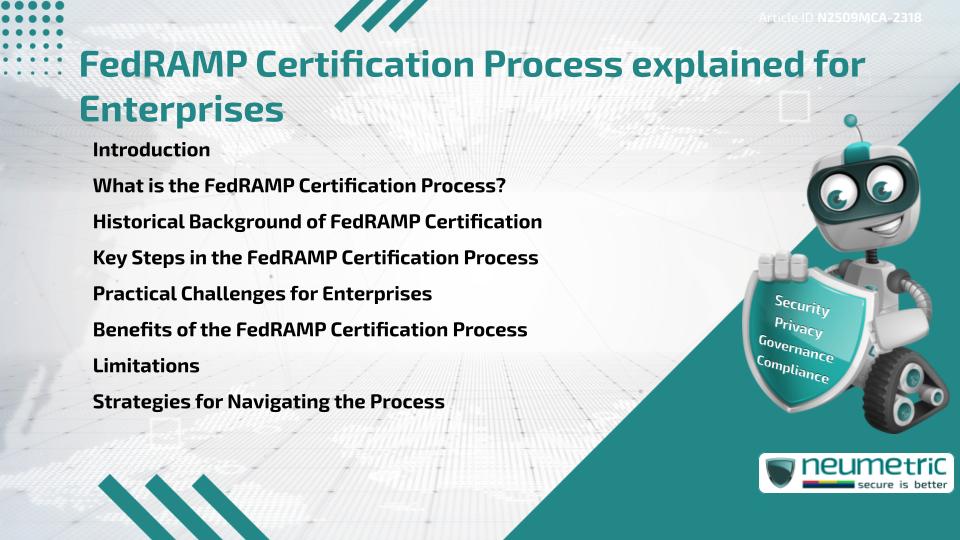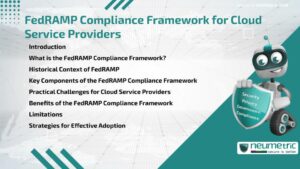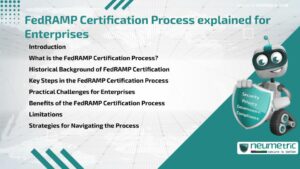Table of Contents
ToggleIntroduction
FedRAMP Certification Process is essential for Cloud Service Providers & Enterprises aiming to work with the U.S. Federal Agencies. The Federal Risk & Authorization Management Program [FedRAMP] provides a Standardised Framework for assessing Cloud Security. For Enterprises, achieving Certification not only opens access to Government Contracts but also strengthens overall Security & Compliance Practices.
What is the FedRAMP Certification Process?
The FedRAMP Certification Process is the Structured pathway Cloud Providers must follow to demonstrate Compliance with FedRAMP’s rigorous Security requirements. Based on NIST 800-53 Controls, the process ensures that Cloud Systems meet Federal Standards for Data Protection, Access Management & Continuous Monitoring. Certification allows Agencies to confidently adopt Cloud Services.
Historical Background of FedRAMP Certification
FedRAMP was launched in 2011 to unify Security requirements for Federal Cloud adoption. Prior to its creation, Agencies conducted separate Security Assessments, resulting in duplication & inefficiencies. FedRAMP Centralised the process by introducing a single, reusable Authorisation Model. Over the years, Certification has become mandatory for Providers seeking Federal Cloud Contracts.
Key Steps in the FedRAMP Certification Process
The process generally includes the following Stages:
- Preparation: Conducting Internal Gap Assessments & Developing a System Security Plan [SSP].
- Third Party Assessment: Engaging a FedRAMP accredited Third Party Assessment Organisation [3PAO] for Testing & Validation.
- Authorisation Path: Pursuing either the Joint Authorisation Board [JAB] Provisional Authorisation or an Agency Authorisation.
- Review & Approval: FedRAMP reviews Documentation & Assessment results before granting Certification.
- Continuous Monitoring: Ongoing Vulnerability Scanning, Incident Reporting & Compliance Updates.
Further details are available at the FedRAMP Program Office.
Practical Challenges for Enterprises
The FedRAMP Certification Process can be Resource intensive. Preparing Documentation like the SSP requires significant Time & Expertise. Costs for Assessments, Audits & Continuous Monitoring may be prohibitive for smaller Providers. In addition, the Certification Timeline, often several Months, can delay Market entry.
Benefits of the FedRAMP Certification Process
Despite challenges, Certification offers Key advantages:
- Access to U.S. Government Cloud Contracts
- Stronger Security Posture through Structured Controls
- Increased Trust with Federal & Commercial Clients
- Reduced duplication of Audits across Agencies
- Competitive advantage in highly regulated Markets
Limitations
Some critics argue that the process is too rigid, slowing Innovation for Cloud Providers. Smaller Enterprises may find Compliance Financially & Technically burdensome. Certification also does not eliminate all Risks, it reduces Vulnerabilities but cannot guarantee immunity from Cyberattacks.
Strategies for Navigating the Process
To succeed, Enterprises should:
- Conduct Readiness Assessments before Formal Audits
- Engage experienced 3PAOs to guide Assessments
- Automate Monitoring & Evidence collection where possible
- Train Internal Teams on FedRAMP requirements
- Leverage External Resources such as OECD Privacy guidelines & World Bank Governance insights for broader Governance Practices
Takeaways
FedRAMP Certification Process is more than a Compliance requirement, it is a strategic investment in Security & Trust. By following Structured steps, Enterprises can achieve Certification, reduce Risks & Unlock opportunities in the Federal Marketplace.
FAQ
What is the FedRAMP Certification Process?
It is the structured pathway Cloud Providers follow to demonstrate Compliance with FedRAMP’s Security requirements.
Why is Certification important?
It is mandatory for Federal Cloud Contracts & Strengthens Overall Security Governance.
What are the main Steps in the Process?
Preparation, Third Party Assessment, Authorisation Path, Review, Approval & Continuous Monitoring.
What challenges do Enterprises face?
High costs, lengthy timelines & complex Documentation requirements.
Does Certification guarantee full Security?
No, but it ensures Systems meet rigorous Federal Standards & Reduces Risks.
References
- FedRAMP Program Office
- NIST CyberSecurity Framework
- OECD Privacy Guidelines
- World Bank Digital Development
- ENISA – European Union Agency for CyberSecurity
Need help for Security, Privacy, Governance & VAPT?
Neumetric provides organisations the necessary help to achieve their CyberSecurity, Compliance, Governance, Privacy, Certifications & Pentesting needs.
Organisations & Businesses, specifically those which provide SaaS & AI Solutions in the Fintech, BFSI & other regulated sectors, usually need a CyberSecurity Partner for meeting & maintaining the ongoing Security & Privacy needs & requirements of their Enterprise Clients & Privacy conscious Customers.
SOC 2, ISO 27001, ISO 42001, NIST, HIPAA, HECVAT, EU GDPR are some of the Frameworks that are served by Fusion – a SaaS, multimodular, multitenant, centralised, automated, CyberSecurity & Compliance Management System.
Neumetric also provides Expert Services for technical Security which covers VAPT for Web Applications, APIs, iOS & Android Mobile Apps, Security Testing for AWS & other Cloud Environments & Cloud Infrastructure & other similar scopes.
Reach out to us by Email or filling out the Contact Form…





